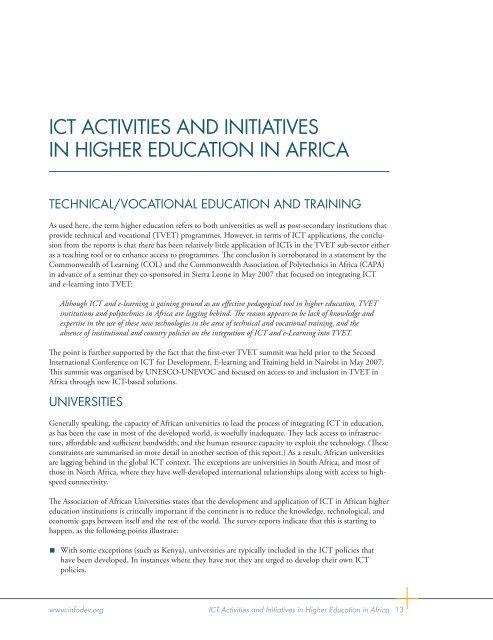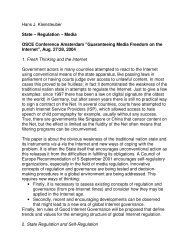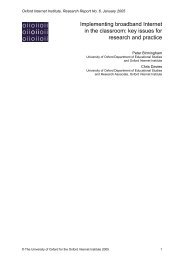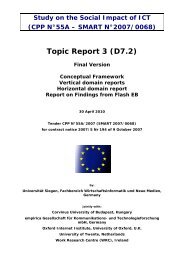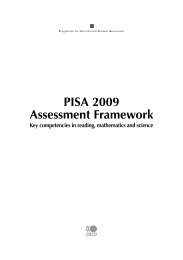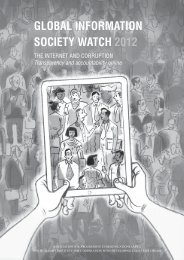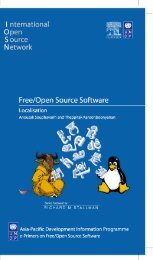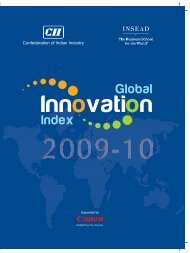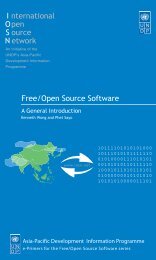<strong>ICT</strong> Activities and Initiativesin Higher Education in AfricaTechnical/Vocational Education and TrainingAs used here, the term higher education refers to both universities as well as post-secondary institutions thatprovide technical and vocational (TVET) programmes. However, in terms of <strong>ICT</strong> applications, the conclusionfrom the reports is that there has been relatively little application of <strong>ICT</strong>s in the TVET sub-sector eitheras a teaching tool or to enhance access to programmes. The conclusion is corroborated in a statement by theCommonwealth of Learning (COL) and the Commonwealth Association of Polytechnics in Africa (CAPA)in advance of a seminar they co-sponsored in Sierra Leone in May 2007 that focused on integrating <strong>ICT</strong>and e-learning into TVET:Although <strong>ICT</strong> and e-learning is gaining ground as an effective pedagogical tool in higher education, TVETinstitutions and polytechnics in Africa are lagging behind. The reason appears to be lack of knowledge andexpertise in the use of these new technologies in the area of technical and vocational training, and theabsence of institutional and country policies on the integration of <strong>ICT</strong> and e-Learning into TVET.The point is further supported by the fact that the first-ever TVET summit was held prior to the SecondInternational Conference on <strong>ICT</strong> for Development, E-learning and Training held in Nairobi in May 2007.This summit was organised by UNESCO-UNEVOC and focused on access to and inclusion in TVET inAfrica through new <strong>ICT</strong>-based solutions.UniversitiesGenerally speaking, the capacity of African universities to lead the process of integrating <strong>ICT</strong> in education,as has been the case in most of the developed world, is woefully inadequate. They lack access to infrastructure,affordable and sufficient bandwidth, and the human resource capacity to exploit the technology. (Theseconstraints are summarised in more detail in another section of this report.) As a result, African universitiesare lagging behind in the global <strong>ICT</strong> context. The exceptions are universities in South Africa, and most ofthose in North Africa, where they have well-developed international relationships along with access to highspeedconnectivity.The Association of African Universities states that the development and application of <strong>ICT</strong> in African highereducation institutions is critically important if the continent is to reduce the knowledge, technological, andeconomic gaps between itself and the rest of the world. The survey reports indicate that this is starting tohappen, as the following points illustrate:nWith some exceptions (such as Kenya), universities are typically included in the <strong>ICT</strong> policies thathave been developed. In instances where they have not they are urged to develop their own <strong>ICT</strong>policies.www.infodev.org <strong>ICT</strong> Activities and Initiatives in Higher Education in Africa 13
nnnnnnInstitutional policy development is being supported by the Association of African Universities, byregional bodies such as the Inter-University Council for East Africa, and through a growing number ofpartnerships with foreign universities in North America, Europe, Australia, and, more recently, India.It is notable that governments are looking to their primary universities as the nodes for leadership inimplementing national <strong>ICT</strong> policies as well as those in the education sector. Makerere University inUganda and the National University of Rwanda are examples.Africa has largely not seen the influx of for-profit, <strong>ICT</strong>-based foreign providers of higher education seenin others parts of the world. However the interactions, collaborations, and partnerships between Africanand foreign universities are increasing—many of them enabled by <strong>ICT</strong> and by a resurgence of donorinterest in higher education.There are two international organisations that deserve special mention because of their work in fosteringinnovative <strong>ICT</strong> applications. One is the Agence Universitaire de la Francophonie (AUF), which isextremely active in facilitating partnership arrangements between African francophone universities andones in France, Canada, and other parts of the French-speaking world. The other is the Partnership forHigher Education in Africa, an initiative supported by seven major foundations in the US with theobjective of accelerating the processes of comprehensive modernisation and strengthening of universitiesin selected countries in Africa. One of the Partnership’s seven major goals focuses on the use of <strong>ICT</strong>.While not exclusively focused on <strong>ICT</strong>, the Development Partnerships in Higher Education programme(DELPHE) initiated by the UK Department for International Development (DFID) is likely to result ina number of projects that aim to enhance the <strong>ICT</strong> capacity of universities. The programme providessupport for partnerships between higher education institutions in the UK and those in participatingcountries in Africa working on collaborative activities related to the MDGs. 8Three Rwandan universities (the National University, the Kigali Institute for Education, and the KigaliInstitute for Science and Technology) and the University of Nairobi have partnered with Google toimprove access to Web-based communications for staff and students. This will allow free access toGoogle applications. 9Distance Education and e-Learningin Higher EducationTraditional print-based distanceducation, assisted by radio and TV, is not new to many parts of Africa,particularly South Africa, Mauritius, and Tanzania, and print remains the predominant delivery tool fordistance education in Africa, as the incorporation of the more modern <strong>ICT</strong>s in the process is constrained bya lack of infrastructure and affordable connectivity in many parts of the continent. Nevertheless, there arenumerous examples of innovative applications of <strong>ICT</strong> in distance education strategies with the result thatthe terms “e-learning,” “virtual universities,” “open universities,” and “virtual schools” are appearing in policyand planning documents. The country reports cite numerous examples of the growing adoption of <strong>ICT</strong>sacross the continent:nnnThe rate of adoption is extremely variable. A 2003 survey commissioned by the Association for theDevelopment of Education in Africa (ADEA) Working Group on Distance Education and OpenLearning found that while the Internet and CD-Roms were used in 35% of francophone institutions,only 5% of anglophone and 0% of lusophone institutions were using them. 10 These results are somewhatskewed by the fact that universities in North Africa enjoy much better connectivity with Europe.The work of the AUF is also influencing <strong>ICT</strong> adoption in francophone institutions. For example, theAUF has created a centre in Lomé, the capital of Togo, that serves four higher education institutionswith 50 computers and high-speed connectivity that enables students to take e-learning courses frominstitutions throughout the francophone world. This model has been replicated in several other francophonecountries in Africa.The African Virtual University (AVU) has established more than 30 learning centres through its partnershipswith higher education institutions in 19 countries offering a variety of courses with a primaryemphasis on teacher training and upgrading.14Survey of <strong>ICT</strong> and Education in Africa: A Summary Report Based on 53 Country Surveys
- Page 1: + MAINSTREAMING ICT and Education S
- Page 5 and 6: Infrastructure in Schools 11Infrast
- Page 7 and 8: larger, on-going, systematic, coord
- Page 10 and 11: Project BackgroundOverviewThis repo
- Page 12: Mary Mmayi, Philip Ouma Ayoo; Dlang
- Page 16 and 17: DANTE (Delivery of Advanced Network
- Page 21 and 22: nnnnand South Africa, have mechanis
- Page 23 and 24: countries. In addition, a very limi
- Page 25: nMauritius uses a fleet of “cyber
- Page 30 and 31: ICT Activities and Initiativesin Pr
- Page 32 and 33: nnnnnnsourced second-hand and refur
- Page 34 and 35: use of ICTs in teaching and learnin
- Page 36 and 37: ICT Activities and Initiativesin No
- Page 38 and 39: Gender Equity and ICTin EducationGe
- Page 40 and 41: Factors Enabling andCONSTRAINING IC
- Page 42 and 43: ICT in Education inAFRICA: A Way Fo
- Page 44 and 45: Notes1. Steiner, R., T. Nyaska, M.
- Page 46 and 47: ANNEXESwww.infodev.org Notes 33
- Page 48 and 49: ANNEX 1:Regional ICT in EducationIn
- Page 50 and 51: prises in Africa and the developing
- Page 52 and 53: LinuxChix Africa | www.africalinuxc
- Page 54: Headquartered in the US, the WCE so
- Page 57 and 58: This book chronicles and analyses t
- Page 59 and 60: “Mozambique ICT4D National Policy
- Page 61 and 62: 3. Primary and Secondary EducationA
- Page 63 and 64: “Intel Gives Nigerian Students Ac
- Page 65 and 66: 4. Tertiary Education“AAU Newslet
- Page 67 and 68: www.aau.org/wghe/publications/wghe_
- Page 69 and 70: An EDC pilot project to build the c
- Page 71: COUNTRIES/AFRICAEXT/EXTAFRREGTOPEDU
- Page 74: SURVEY OF ICT AND EDUCATION IN AFRI


